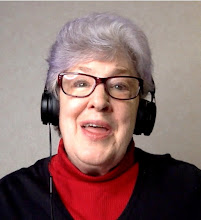Now that Sapporo Symphony Chorus is aware of my amazing credentials (since I made sure they did!), I was asked to make a CD of pronunciation for "Peter Grimes," the opera we're performing in September.
After the absurdity (and agony) of sitting through an English pronunciation lesson by a Japanese professor (selected, apparently, because his area of expertise is Shakespeare), I simply couldn't sit back and be quiet any longer (which is one reason I make a terrible Japanese person). One reason they may have been reluctant to ask me for more help with pronunciation may be that, because I'm American, they assumed I would only teach so-called American pronunciation. What I decided to do is write to the contact person for the Symphony Chorus letting him know about my background in theatre, including acting in, directing, and teaching British drama.
In composing my message, I was fortunate to have an American friend advise me in the tone of the message and how to convey a sense of wanting to cooperate, in the best Japanese spirit. She made sure I understood how important it was not to undermine the Japanese professor, and to say how valuable the lesson was, even though I actually thought it barely adequate. Most importantly, I let them know that my services would be free!
In composing my message, I was fortunate to have an American friend advise me in the tone of the message and how to convey a sense of wanting to cooperate, in the best Japanese spirit. She made sure I understood how important it was not to undermine the Japanese professor, and to say how valuable the lesson was, even though I actually thought it barely adequate. Most importantly, I let them know that my services would be free!
The contact person responded to my email (which was almost like a resume, including all the universities where I've taught and the fact that I've taught pronunciation as well as other aspects of English to students from over 60 countries), with the following:
Thank you very much for your sincere proposal.
I will convey your mind and career to the chorus members, Osanai sensei and Oshima sensei.
I think your help will be valuable for us to advance our English pronunciation.
And I hope the comunication around you will develop fellowship and friendship between the chorus members.
Not only that, but he asked if he might forward the message to the contact person for the Sapporo Symphony Orchestra, to which I immediately responded that it was fine. A few days later I got a message from her including the following:
I'd like to express to you my deepest gratitude for thinking about Sapporo Symphony Chorus. Since we started singing P.G. I've been thinking that I want to learn English pronunciation from CA-san. Actually, Prof. H________' lesson was a lucid, so we understood the basis. I think he is excellent,and I enjoyed his lesson.But,there is a limit to everything… . Nobody pronunces English like you.So we have to learn real English pronunciation from you. Fortunately,you are in our chorus. Please contrivute to our concert's success. I really hope so!! I want you to help the conductors and us as a professional teacher of ESL.
I was ecstatic because it was the first time my expertise had been openly acknowledged. I was so glad I had sent an email because I feel that it has opened up a line of communication for the first time. It was also interesting that, although hardly anyone speaks to me in English at rehearsals, except for a friend who lived in England for a year, both contact people are able to use English. I guess they just needed a bit of a nudge.
Now everyone has a copy of the CD, with my best approximation of British pronunciation. Although the Sapporo Academy Chorus conductor has been asking me to check pronunciation during rehearsals, it remains to be seen how much the Sapporo Symphony Chorus conductors will acknowledge the presence of a native speaker of English in their midst. At least other members of both choruses have already started feeling more comfortable asking me questions about pronunciation.




